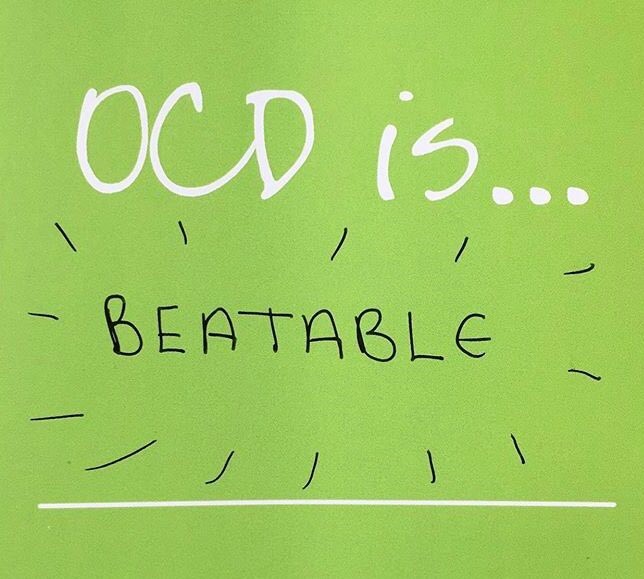OCD is an anxiety disorder that is characterised by unwanted intrusive thoughts which create intense distress, leading the sufferer to feel compelled to do something to prevent harm being caused to either themselves or others.
Within society, people tend to think OCD is just about liking things clean, but this could not be further from the truth. Those with OCD feel overly responsible to prevent harm being caused and can spend hours and hours completing rituals that they believe will stop or lessen the likelihood of the harm being caused.
Contamination OCD accounts for between 25-50% of OCD cases, and the recurrent and persistent thoughts sufferers may experience tend to be related to feeling of being or getting contaminated directly or indirectly by a harmful or contagious source. As a result of these worries, those with contamination OCD can carry out behaviours such as excessive cleaning of themselves, their clothes, and surroundings in a bid to significantly lessen but preferably eradicate the risk of getting or being contaminated.
These very rituals were initially used as a solution to the unwanted intrusive thoughts. For instance, it makes sense if an individual had the thought, "my Mum will get ill with Coronavirus and die if I don't wash my hands seven times," why that individual would go on to wash their hands seven times because they genuinely believe their actions are stopping harm from being caused to their loved one. But, over time, this solution becomes a problem because firstly, the person with OCD does not ever learn how the world really works and what would happen if they didn't wash their hands seven times. Secondly, they typically notice that they need to perform the ritual more and more to try and get the desired reduction in their distress. However, this leads to more time spent on the rituals, meaning they are more focused on them, leading them to be more distressed and needing to continue ritualising to try and feel better. These unhelpful responses to intrusions can often worsen to the point where sufferers can spend hours leaving the house because the rituals are taking so much of their time. Sounds exhausting doesn't it?
Well throw into that a global pandemic. There is a harmful and extremely contagious source circulating our world right now. The Coronavirus has affected those with OCD in two different ways. The typical and not so surprising way is that it has made those with OCD want to clean even more so. The difficulty with this is we are all being asked to do the same. So, people with OCD may think they are justified in performing their OCD behaviours. However, some are actually feeling better, and this could be a problem because the whole world is engaging in the same behaviours that the OCD sufferer would typically engage in right now, which will likely serve as a form of avoidance for them. The person may feel their OCD is better, but it's actually still there, just that avoidance of the OCD is easier when the world is significantly more concerned with contamination and are taking the appropriate action to manage it.
Tips for coping with OCD during the pandemic:
It is completely understandable why those with contamination OCD may feel their fears are heightened now. As a result, people with OCD may be engaging in even more compulsions such as excessively washing their hands, checking the news, or, for some, avoidance of programmes that talk about contamination, etc.
Some tips to manage this can be things such as:
- Only washing your hands for the recommended twenty seconds with soap and water and not a second longer. Those with OCD may feel the urge to wash their hands for longer or on multiple occasions in quick succession. Doing this will be giving in to the OCD, so try and think about what the government guidelines are and not what OCD wants you to do.
- Resist watching the news to try and learn to tolerate some uncertainty (intolerance of uncertainty plays a big role in the maintenance of OCD). Or it may be that you need to sit and watch the news about contamination and tolerate the feelings or anxiety that come along with it, rather than avoiding it altogether.
- Try and touch things around your home as you usually would or as much as others in your home do, instead of avoiding touching items that you believe to be unclean or contaminated.
- Try and resist the urge to ask for reassurance from others about your intrusions. For example, resist asking a family member if they think you washed your hands perfectly, or whether they think you will be safe going to the local shop to get milk. Sharing your fears is fine but obtaining reassurance crosses the line into an OCD behaviour.
- Keep checking of the internet to a minimum because the excessive checking can make you more worried about the virus as you are focusing more on it.
- Stick to the facts! OCD is a bully, trying to make you doubt whether you are clean enough or safe enough. These worries can in turn lead to more compulsions. So, stick to what we know about Coronavirus from reputable sources such as the GOV.UK website (see below). There are some charities listed below for more information about OCD and its treatment.
Useful Links:
https://www.gov.uk/coronavirus
